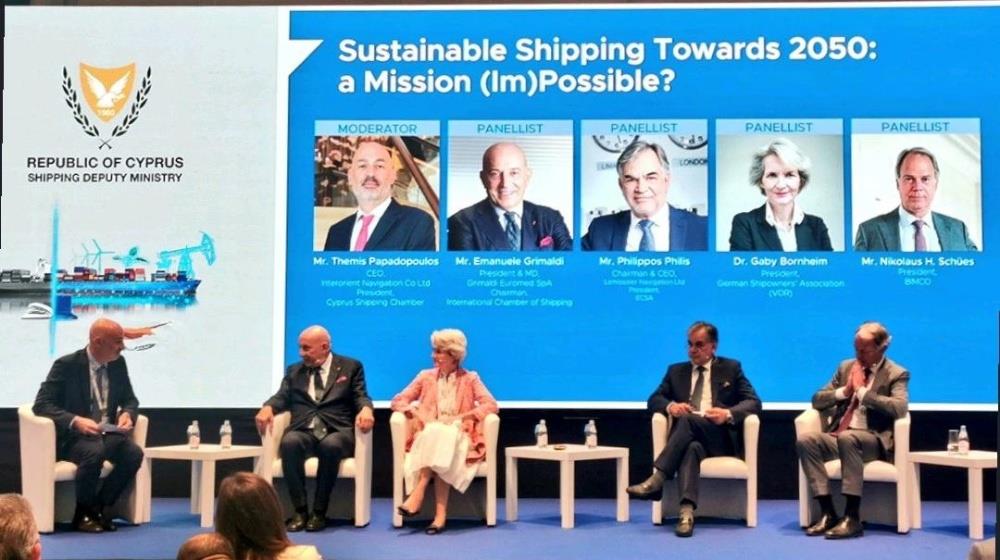Expert stakeholders discussed ‘Sustainable Shipping towards 2050: a Mission (Im)Possible?’ during the first of two panel discussions at the Maritime Cyprus Conference in Limassol.
The panel was made up of Themis Papadopoulos, Cyprus Shipping Chamber (CSC) President, and CEO, Interorient Navigation Co Ltd who acted as Moderator, Emanuele Grimaldi, International Chamber of Shipping (ICS) Chairman and President & MD, Grimaldi Euromed SpA, Philippos Philis, European Community Shipowners' Associations (ECSA) President and Chairman & CEO, Lemissoler Navigation Ltd, Dr Gaby Bornheim, President, German Shipowners' Association, and Nikolaus H. Schues, President, BIMCO.
Grimaldi noted that there were several obstacles to achieving sustainability but that it was something that all stakeholders, as well as those beyond the sipping sector, had to be involved in. “My perception is that to reach this goal, we have to be the leaders, the pioneers. We will have to use the expensive fuels in the beginning.”
He continued that one of the ways this gap could be breached, something he described as a funding system would be required with contributions from beyond the shipowners themselves and which would also, among other things, also assist developing countries to keep up.
On his part, Philis noted that absolute reduction was not easily achievable when it came to lessening emissions created by the shipping industry. He continued that the industry had already reduced its emissions significantly over the years but that more time was still required.
He expressed the opinion that shipowners were not being supported enough by the very bodies that were demanding that they lower emissions. Examples included suppliers not being in a position to provide the new fuels that had been mandated. Philis also says shipowners are not being included in pertinent discussions.
Bornheim commented on the gap in the availability of alternative fuels. She said that the industry needs to be fully aligned to ensure the fuels are available and suggested clearer instructions on how shipowners should be proceeding would be a valuable tool.
On the availability of a range of alternatives in the future, Schues suggested that in 2018, stakeholders had complained about the need for regulation, while by Spring this year, the industry was asking the IMO for instructions. The updated instructions were welcomed in July but since then, experts had begun to suggest that some of the milestones were unachievable, he continued.
“BIMCO believes we should term towards optimism again, yes the milestones are hard to reach but there are ways to reach them,” Shues continued. These ways included support, including finances being reinjected into shipping, among other things.
He also noted that the shipping industry had shown its resilience many times in the past.
On the potential of a global system following the EU’s regional Emmission Trading Scheme (ETS) scheme due to begin next year, Grimaldi said that from an industry point of view, this issue brought up huge concerns. The first, he said, was that the ETS scheme would almost certainly be followed by others that would create administrative difficulties. He suggested that an IMO ‘reward scheme’ may be warranted to help keep things moving smoothly, encouraging companies to fulfill their obligations.
On the reward system, Shues said BIMCO was in discussion with the EU on the wider issue. “The EU has to reconsider its own trading system,” he suggested, saying one international regulation for the shipping industry would be better than a mix of trading schemes around the world.
Philis said that the issue was complicated although ETS was a significant milestone for the European shipping industry. “We as ECSA prefer a global system,” he continued, adding that different administration systems that would be required by different systems, which would also create significant expense.
He also noted that while the industry would adjust, “cooperation is a must.”
Philis also cautioned that some administrations were not yet in a position to respond to the regulation, “We need all hands on deck otherwise we cannot move forward.”
Bornheim said that clear regulations were needed and that, for example, opening accounts with the EU to purchase (fuel) allowances was not enough. “There is a certain uncertainty we have to deal with,” she continued, noting that shipowners had already taken actions to reduce their footprint even though more needs to be done. “It is a manifold environment,” she continued, noting that fuel suppliers and ports also had to be included in the equation.
Taking steps such as replacing traditional fuels with alternatives such as ammonia, for example, was not yet feasible due to the volumes that would be required, Bornheim continued.
On the future availability of alternative fuels, Grimaldi said that while there were multiple solutions including electricity for small craft, although, even there, this would have to be created in a ‘green’ manner. “It is nice to say we combine air and water to produce ammonia, but it also requires a huge amount of energy,” he noted. Carbon capture was also an important factor, Grimaldi continued, something the oil companies were already taking action on.
Bornheim also said that some of the funds contributed by the shipping industry could be distributed back to the sector to better support the sector’s efforts to move towards sustainability.
“We have to be very careful how to finance any measures we take on our way to net zero,” she continued, noting that financing could come from countries that were not bound by international treaties, which could create negative developments.
Philis agreed that turning towards unregulated financing was a risk but that over-regulation could push financing in this direction.
Grimaldi said that what had to be avoided was “prejudice and fundamentalism,” adding that a more sustainable ship should have better access to tax incentives and other benefits than an older one that was not as effective.
The floor was then opened to the audience for questions.









